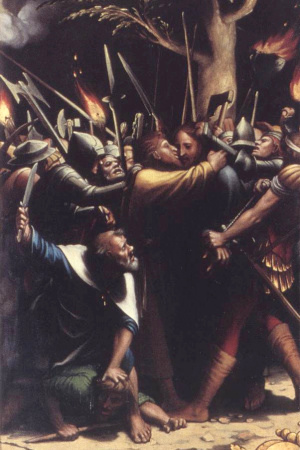The official arrest happened in the dead of night. Judas, who had betrayed Jesus to Jewish religious leaders who hated him, came with an armed group of men to the garden of Gethsemane. After he greeted Christ with a kiss, (a signal meant to designate whom to take into custody) our Savior was placed under arrest and taken to Jewish authorities for questioning and what would become at least two trials.
There was NO legal basis for the arrest of Jesus as there were never any formal charges registered against him! Additionally, no evidence of illegal activity, from credible witnesses, was ever offered to justify him being taken by force to answer allegations against himself (Matthew 26:59 - 60, Mark 14:55). He was simply placed under arrest and taken into custody at the behest of the religious leaders who wanted him dead.
At his first questioning, which was before a previous High Priest named Annas (John 18:13), not a single witness appeared that charged Jesus with committing any crime (verses 19 - 24).
His second appearance before religious authorities (his first real trial) took place around 2 a.m. The Sanhedrin, or more properly the Great Sanhedrin, was the supreme council of the Jews composed of seventy elders plus the high priest. They, who at the time met in a chamber within Jerusalem's temple known as the chamber of hewn stones, had jurisdiction over religious matters. At the trial, there were no witnesses presented that justified Jesus' arrest or appearance before the court (Mark 14:53, 55).

What occurred was clearly against Biblical law, especially the command in Deuteronomy 19 regarding being charged for wrongdoing. Deuteronomy 19:15 states that it requires at least TWO witnesses in order for a person to be convicted of disobedience and punished.
An accomplice is involved
As stated previously, it was Judas Iscariot, one of the disciples, who led authorities to make an arrest (Mark 14:43 - 44).
The problem is, because of his close association with the person arrested and taken into custody, Judas could easily be considered an accomplice. An accomplice is someone who knowingly aids another in a crime or wrongdoing.
If Jesus were believed to be a criminal, then the twelve disciples (including Judas) would be accomplices in his "illegal" activities. The use of an accomplice to effect the arrest or conviction of a person was forbidden by Jewish (Hebrew) law (Walter Chandler, The Trial of Jesus, Volume 1, pages 228 - 229).
In the middle of the night
The arrest of Jesus was set in motion by chief priests who offered bribes to Judas to take them to him during the night (Matthew 26:14 - 16). Judas would not have been needed if the religious leaders were merely looking for ANY opportunity to take the Son of God. For, as Jesus stated in Mark 14:48 - 49, he openly taught in Jerusalem's temple and therefore could have been taken at any time.
What the council wanted, however, was to hide the evil they were doing! They wanted to subvert the entire legal process so that they could "legally" murder him! Perverting justice is condemned in scripture (see Exodus 23:2, Deuteronomy 16:19 and Leviticus 19:15 - 16).
The arrest of Jesus was a conspiracy by his enemies to subvert and pervert the entire legal process so that he could be put to death. What happened to him is the greatest travesty of justice the world will ever see.